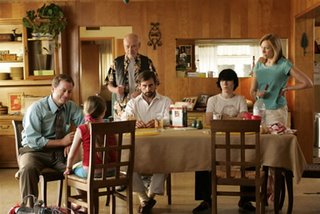 Little Miss Sunshine
Little Miss Sunshine, the Sundance-winning feature debut from husband and wife directing team Jonathan Dayton and Valerie Faris, takes a stock film genre, the dysfunctional family road-trip, and with the help of a razor-sharp script from fellow newcomer Michael Arndt, breathes into it new, albeit warped and sardonic, life.
The American everyman Greg Kinnear and the brilliant Toni Collette are Richard and Sheryl Hoover, a married couple barely holding everything together in the flat-pack suburbs of Albuquerque. She’s tired of trying, feeding the family take-out chicken on paper plates while he’s a failed motivational speaker. They have two children; teenager Dwayne (Paul Dano), who is devoted to Nietzsche and has taken a vow of silence until he is allowed to join the air force and the younger Olive (Abigail Breslin), a chubby seven year old who harbours dreams of becoming a beauty queen. Their grandpa (the extraordinary Alan Arkin) is helping her achieve this dream, in between hits from his heroin stash. When Sheryl’s brother Frank (Steve Carell), a literature professor, fails in a suicide attempt and has nowhere left to go, she takes him in, completing the dysfunctional clan. All they need now is something to do; which, when another kid drops out, takes the shape of a cross-country road trip to take little Olive to the titular Little Miss Sunshine pageant in California. With little money, they pile into the family van and hit the road.
Following the standard set by Chevy Chase in another space and time, the Hoovers clapped-out VW bus encounters engine trouble, with the part required obviously not immediately available. Dauntless, they struggle on, introducing a repeated gag where the cheerleading Richard sits behind the wheel while the rest of the family pushes, running alongside and leaping into the cabin as the van gains momentum. As a symbol of struggle, and how tenuous a hold we all have on our sense of self-belief, the backfiring yellow van would take some beating. Taking them from fleapit motels to cheap roadside diners, across the physical spaces of the American countryside and the psychological spaces between them all, it’s the vehicle, literally, that allows the estranged Hoovers to find again their freedom and the love for each other, something they have let the hassles of daily life erode away.
The screenplay allows these characters to interact in a marvellously natural manner, with the finely tuned comedy brilliantly brought to life by the stellar cast, with Carell in particular displaying a hitherto unsuspected affinity for playing bitter and lost. Kinnear’s Richard, a flailing paterfamilias has a wound-up smirk and a fine line in peppy clichés while Colette tries to hide her disappointment and despair behind an open face and a level gaze. It’s rare in film that a cast can form a credible family as completely as the Hoover’s do. The road trip, taken chiefly to give the troublingly remote Olive some much needed interaction, becomes a kind of rescue mission for the family itself, which is coming apart at the seams. Hidden away, somewhere between the bitter jokes and the gradual burn of the character’s development, there is a constant, overwhelming sense of the simple struggles of middle-class American life – a myriad of financial and career problems, the closed doors of alienated teenagers, the dreams of children and the desperate attempts by their parents to both enable them and establish a barrier that protects them from life’s hard truths for as long as possible. Illuminating this in a typically understated moment, the silent Dwayne, desperate to leave his hated family behind, turns down to sound on the TV in order to better hear his parents argue.
Although the story, which starts as a keenly observed slice of disillusioned American life, reaches beyond incredulity towards the finish, the characters sing true throughout, regardless of the increasingly daft things they are required to do. Their honesty and humanity is underscored when the Hoovers meet the other pageant parents, a collection of aspirant monsters and pushy snobs smothering their children in airbrushed fake tan and choreography. They might be struggling to keep their place on the ladder and disintegrating before our eyes, but the family never pretend to be anything other than themselves. It might take as its starting point a well-established cinema formula, but that’s not the same thing as being formulaic. Quirky, darkly observant and distinctly individual, Little Miss Sunshine is also heart-warming, funny and life affirming, and there’s no blueprint for that.
 Little Miss Sunshine, the Sundance-winning feature debut from husband and wife directing team Jonathan Dayton and Valerie Faris, takes a stock film genre, the dysfunctional family road-trip, and with the help of a razor-sharp script from fellow newcomer Michael Arndt, breathes into it new, albeit warped and sardonic, life.
Little Miss Sunshine, the Sundance-winning feature debut from husband and wife directing team Jonathan Dayton and Valerie Faris, takes a stock film genre, the dysfunctional family road-trip, and with the help of a razor-sharp script from fellow newcomer Michael Arndt, breathes into it new, albeit warped and sardonic, life. 







2 comments:
I really loved this film. Yes, a little predictable in places. But still, wonderful film
i saw this last night and loved it.
and a nice review.
we had a van when we were children. there's heaps of van related comedy.
Post a Comment